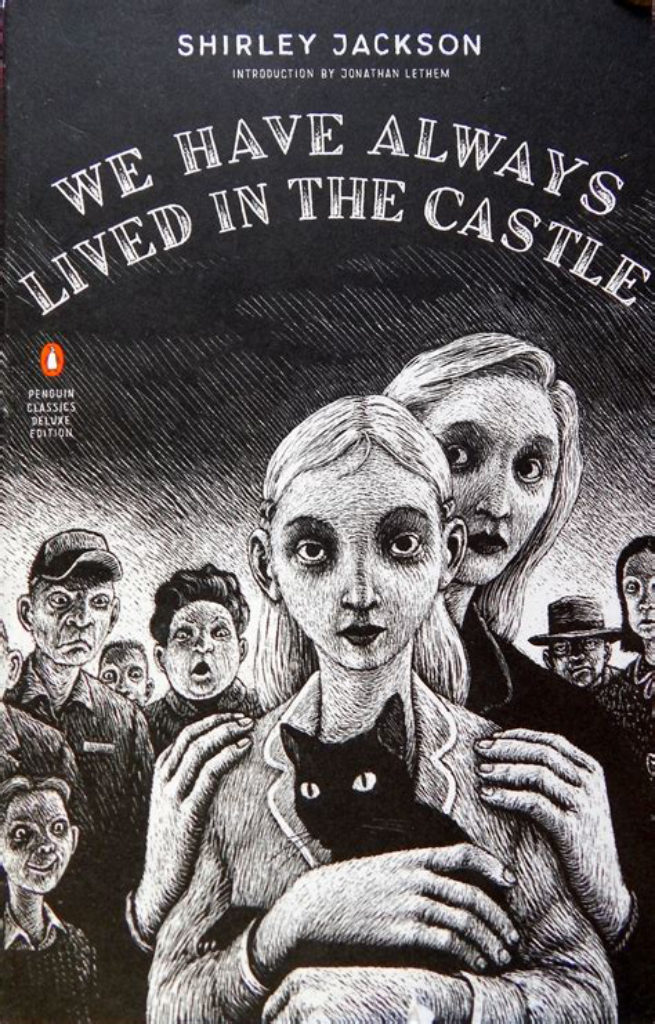We Have Always Lived in the Castle by Shirley Jackson has been reviewed by Focus on the Family’s marriage and parenting magazine.

We Have Always Lived in the Castle by Shirley Jackson has been reviewed by Focus on the Family’s marriage and parenting magazine.
Eighteen-year-old Mary Katherine (Merricat) Blackwood lives with her older sister, Constance, their ailing Uncle Julian and her faithful cat, Jonas, in their family’s large estate. She begins her narrative by describing her weekly trip into the village for supplies. As always, the townspeople bully and gawk at her. Some chant childish rhymes about her and her sister. As always, she wishes and imagines them dead.
Constance never leaves the house. When Mrs. Clarke and Mrs. Wright from town visit, Uncle Julian reveals details of the horrible murders that took place in the house six years earlier. Someone put arsenic in the sugar bowl. Julian’s wife, as well as the girls’ parents and brother, died.
Julian ate some of the poisoned sugar, and he’s been an invalid ever since. Julian frequently mentions he’s working on a book about the murders. He keeps track of every detail he can remember from that day, yet he often asks Constance if the whole thing even happened. Readers learn Constance was tried for the murders and acquitted.
During the trial, Merricat lived in the local orphanage. Mrs. Clarke and Mrs. Wright urge Constance to leave the house now and then. When the women leave, the Blackwoods laugh, as they often do, about the morbidly curious townsfolk.
Merricat begins to sense a change in the air. She invents enchanted words, buries household items in the yard and nails one of her father’s books to a tree, all in an effort to magically prevent change. Readers gradually begin to sense her immaturity and question her grasp of reality. Constance assures Merricat the only change ahead is the start of spring. Then Cousin Charles arrives.
Charles’ father (another brother of Julian’s) refused to help the family during Constance’s trial. Charles says as soon as his father died, he came to see how he could assist the girls. Julian and Merricat detect Charles’ ulterior motives, but Constance relishes his attention.
Charles moves in to Father’s room and begins taking Father’s items. He’s irritable with Julian and Merricat, and makes subtle threats, all the while convincing Constance she’s done the family a disservice by allowing them to live this way. Merricat rearranges his room. She hopes to confuse him by making him think he’s in the wrong house. When he threatens her with punishment for doing this, she returns to his room and pushes his lit pipe onto some papers. The house catches on fire.
Townspeople come to gawk, and many suggest the fire chief should let the house burn. Charles repeatedly orders people to drag Father’s safe full of money from the flames. Villagers begin stealing items and throwing rocks to break the windows. Merricat and Constance hide until the blaze is out and the townspeople have gone. They learn Julian didn’t survive the ordeal.
The girls barricade themselves in the house and sift through the rubble. Only a few rooms remain livable, so they close all other doors permanently. Merricat notes how much she’d like to kill everyone. Constance’s reply reveals Merricat was the one who poisoned the Blackwood family six years earlier. Constance regrets mentioning it, and it is clear she will never reveal her sister’s guilt.
In the days that follow, several townspeople and Charles come to check on the girls. Merricat and Constance won’t open the door, nor do they indicate they’re inside. Guilt and fear overtake many of the villagers. They begin bringing food and leaving it on the front porch each day. As the girls eat the neighbors’ food, locked in their burned-out home, Merricat notes how happy they are.
None
Merricat believes she can generate protective magic over her home and family by choosing enchanted words, burying items and nailing her father’s book to a tree. She believes certain events are omens of change.
According to Uncle Julian, Father resented him and his wife for living in their home and eating their food. Charles feigns concern for the family, while trying to steal their money. Constance faithfully protects her remaining family members. Constance feels guilty when she accidentally reminds her sister that she (Merricat) poisoned the family.
The Lord’s name is used in vain a few times. D–n, h— and b–tard also appear a time or two.
None (Although in the introduction of this edition, critic Jonathan Lethem talks about the sexuality he believes is embedded in the text.)
Get free discussion questions for this book and others, at FocusOnTheFamily.com/discuss-books.
You can request a review of a title you can’t find at [email protected].
Book reviews cover the content, themes and worldviews of fiction books, not their literary merit, and equip parents to decide whether a book is appropriate for their children. The inclusion of a book’s review does not constitute an endorsement by Focus on the Family.